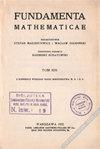Belinskaya定理是最优的
IF 0.5
3区 数学
Q3 MATHEMATICS
引用次数: 1
摘要
Belinskaya定理指出,给定一个遍历测度保持变换,任何其他具有相同轨道和$\mathrm{L}^1$共循环的变换都必须与其翻转共轭。我们的主要结果表明,该定理是最优的:对于所有$p<1$,共循环上的可积条件不能放松为在$\mathrm{L}^ p$中。这也让我们能够回答Kerr和Li的一个问题:对于遍历测度保持变换,Shannon轨道等价不归结为翻转共轭。本文章由计算机程序翻译,如有差异,请以英文原文为准。
Belinskaya’s theorem is optimal
Belinskaya's theorem states that given an ergodic measure-preserving transformation, any other transformation with the same orbits and an $\mathrm{L}^1$ cocycle must be flip-conjugate to it. Our main result shows that this theorem is optimal: for all $p<1$ the integrability condition on the cocycle cannot be relaxed to being in $\mathrm{L}^p$. This also allows us to answer a question of Kerr and Li: for ergodic measure-preserving transformations, Shannon orbit equivalence doesn't boil down to flip-conjugacy.
求助全文
通过发布文献求助,成功后即可免费获取论文全文。
去求助
来源期刊

Fundamenta Mathematicae
数学-数学
CiteScore
1.00
自引率
0.00%
发文量
44
审稿时长
6-12 weeks
期刊介绍:
FUNDAMENTA MATHEMATICAE concentrates on papers devoted to
Set Theory,
Mathematical Logic and Foundations of Mathematics,
Topology and its Interactions with Algebra,
Dynamical Systems.
 求助内容:
求助内容: 应助结果提醒方式:
应助结果提醒方式:


